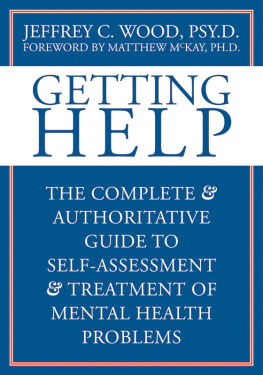To my wife, as well as all of the case managers who are a constant inspiration for this work.
Shaun M. Eack, PhD
To case managers, with thanks for their work.
Catherine G. Greeno, PhD
FOR INFORMATION:
SAGE Publications, Inc.
2455 Teller Road
Thousand Oaks, California 91320
E-mail: order@sagepub.com
SAGE Publications Ltd.
1 Oliver's Yard
55 City Road
London EC1Y 1SP
United Kingdom
SAGE Publications India Pvt. Ltd.
B 1/I 1 Mohan Cooperative Industrial Area
Mathura Road, New Delhi 110 044
India
SAGE Publications Asia-Pacific Pte. Ltd.
3 Church Street
#10-04 Samsung Hub
Singapore 049483
Copyright 2013 by SAGE Publications, Inc.
All rights reserved. No part of this book may be reproduced or utilized in any form or by any means, electronic or mechanical, including photocopying, recording, or by any information storage and retrieval system, without permission in writing from the publisher.
Printed in the United States of America.
Library of Congress Cataloging-in-Publication Data
Eack, Shaun M.
Mental health case management: a practical guide / Shaun M. Eack, Carol M. Anderson, Catherine G. Greeno.
p. cm.
Includes bibliographical references and index.
ISBN 978-1-4522-3526-4 (pbk.)
1. Mentally illCare. 2. Mental health services.
3. Management. I. Anderson, Carol M., 1939- II. Greeno, Catherine G. III. Title.
RC480.53.E23 2013
3623.19689dc232012010924
This book is printed on acid-free paper.
12 13 14 15 16 10 9 8 7 6 5 4 3 2 1
Acquisitions Editor: Kassie Graves
Editorial Assistant: Elizabeth Luizzi
Production Editor: Laureen Gleason
Copy Editor: Megan Granger
Typesetter: C&M Digitals (P) Ltd.
Proofreader: Cheryl Rivard
Indexer: Karen Wiley
Cover Designer: Candice Harman
Marketing Manager: Lisa Brown
Permissions Editor: Adele Hutchinson
Remembering and Respecting the Dignity of the Individual
You are about to take on an important and challenging job helping some of the most vulnerable individuals in society use their strengths to recover from serious mental disorders. Many will have lost their independence, initiative, and creativity from years of repeated episodes of illness and ineffective treatment in institutions. It is crucial to remember that despite their psychiatric disabilities, they also will have strengths, goals, and the need for recognitionjust as the rest of us do. They deserve a chance to pursue their forgotten dreams and to use their abilities to establish independent and fulfilling lives. They are experts in what they will need to progress in their journeys toward more functional and rewarding lives. With your help, and using the principles of recovery, they can take advantage of opportunities that have been beyond their grasp. With your help, they can move from the edges of society's tolerance to become full and productive members of their communities. Without your help, and without help from the rest of the team assigned to their care, they risk remaining on the margins, trapped in a cycle of repeated hospitalizations and failure.
As a case manager, you can play a crucial role in helping these individuals cope with their illness by using their own strengths to make the transition to a new life. It all begins with your establishing a collaborative relationship that respects their dignity and strengths. Based on this respect, you will work with these individuals, empowering them to accomplish their goals. This manual is designed to give you a brief introduction to the common issues you will encounter during your work and some of the basic knowledge you will need to address these issues. It does not represent a prescription for what to do to people but, rather, what you can do with people to help them lead the most fulfilling lives possible. Good case managers know that respecting the dignity of those they serve always comes first. Whether you are working to help individuals access services during an acute crisis or to accomplish a positive goal such as living independently or finding a job, you will need to find ways to preserve their self-respect and foster their autonomy. With this focus as a foundation, you will be able to develop a collaborative and empowering relationship that provides opportunities to facilitate real progress and change. You will become increasingly aware of the profound (but too-often overlooked) capabilities of persons with severe mental illness. As you help them use these capabilities and accumulate small successes, you will also become aware that your job as a case manager is, above all, honorable and important work.
Acknowledgments
The authors would like to acknowledge Stephen Christian-Michaels for his feedback and critical support in developing this book. This work was supported in part by National Institute of Mental Health grant MH-66872 to Dr. Anderson.
SAGE and the authors gratefully acknowledge the contributions of the following reviewers: Rebekah F. Cole, Old Dominion University; Julia M. Forman, Walden University; LaKeisha L. Harris, University of Maryland Eastern Shore; Bonnie F. Hatchett, University of ArkansasPine Bluff; Brandon Hunt, Pennsylvania State University; Michael A. Mancini, Saint Louis University; and Rebecca G. McBride, Old Dominion University.
Introduction
Importance of the Case Manager in Community Mental Health
A good case manager is probably the most important professional in the lives of severely mentally ill individuals recovering in the community. Psychiatrists may prescribe medicine, therapists may provide therapy, and employment specialists may help find jobs, but good case managers make the work of all these professionals possible. They help connect people with services, coordinate care, and ensure that what is being provided is relevant to the current needs and dreams of specific individuals. Whether these individuals have experienced months, or even years, of confusion from unremitting delusions or voices, repeated mood swings, social isolation, or the difficulties in adjusting to life in the community after decades in a psychiatric hospital, all will benefit from case management done right. In fact, in a time of limited and fragmented community resources, many individuals would receive little help at all if not for the abilities of case managers reaching out to engage and connect people to the range of services they need. Case managers worth their salt are lifesavers, because services are of little use to people who cannot access them!












